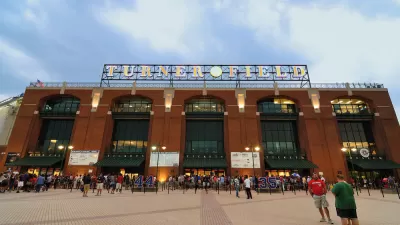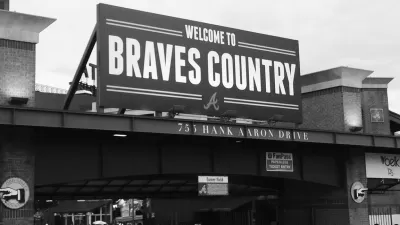The Atlanta Braves are planning a new stadium, opening in 2017, in suburban Cobb County. How much residual development investment should local stakeholders expect?
The taxpayers of Cobb County will pay $300 million to help finance a new baseball stadium for the Atlanta Braves, but the hope is that the investment will return more than regular attendance to games. “Supporters of a new Atlanta Braves stadium in Cobb County say it will be an economic home run, the centerpiece of a massive mixed-use entertainment district…”
To examine the claim that the new stadium will be an economic boom for Cobb County, Dan Klepal and David Wickert examine a related suburban case study provided by the team’s AAA affiliate, which promised similar development benefits when building a stadium in Lawrenceville, Gwinnett County, in 2009.
“Nearly five years after it opened, Coolray Field still isn’t generating enough revenue to pay for itself, as county officials said it would. Plans for development at the stadium have become ensnared in litigation and, for the most part, haven’t materialized. And attendance at Gwinnett Braves games is among the worst in the International League.”
In addition to the minor leagues being a far cry from the big leagues, there are reasons to expect better results from the Cobb County stadium: “the Braves will own the property around the stadium and will have a vested interest in developing it.”
The Braves also announced this week that they are negotiating a contract with Populous, designer of 19 of the 30 current major league stadiums, to design the new $672 million stadium.
FULL STORY: Last suburban stadium didn’t live up to promises

Alabama: Trump Terminates Settlements for Black Communities Harmed By Raw Sewage
Trump deemed the landmark civil rights agreement “illegal DEI and environmental justice policy.”

Study: Maui’s Plan to Convert Vacation Rentals to Long-Term Housing Could Cause Nearly $1 Billion Economic Loss
The plan would reduce visitor accommodation by 25% resulting in 1,900 jobs lost.

Planetizen Federal Action Tracker
A weekly monitor of how Trump’s orders and actions are impacting planners and planning in America.

Wind Energy on the Rise Despite Federal Policy Reversal
The Trump administration is revoking federal support for renewable energy, but demand for new projects continues unabated.

Passengers Flock to Caltrain After Electrification
The new electric trains are running faster and more reliably, leading to strong ridership growth on the Bay Area rail system.

Texas Churches Rally Behind ‘Yes in God’s Back Yard’ Legislation
Religious leaders want the state to reduce zoning regulations to streamline leasing church-owned land to housing developers.
Urban Design for Planners 1: Software Tools
This six-course series explores essential urban design concepts using open source software and equips planners with the tools they need to participate fully in the urban design process.
Planning for Universal Design
Learn the tools for implementing Universal Design in planning regulations.
Caltrans
Smith Gee Studio
Institute for Housing and Urban Development Studies (IHS)
City of Grandview
Harvard GSD Executive Education
Toledo-Lucas County Plan Commissions
Salt Lake City
NYU Wagner Graduate School of Public Service




























